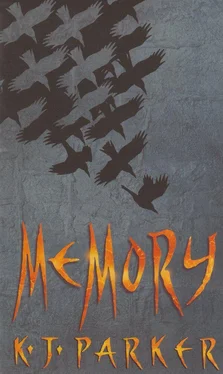K Parker - Memory
Здесь есть возможность читать онлайн «K Parker - Memory» весь текст электронной книги совершенно бесплатно (целиком полную версию без сокращений). В некоторых случаях можно слушать аудио, скачать через торрент в формате fb2 и присутствует краткое содержание. Жанр: Фэнтези, на английском языке. Описание произведения, (предисловие) а так же отзывы посетителей доступны на портале библиотеки ЛибКат.
- Название:Memory
- Автор:
- Жанр:
- Год:неизвестен
- ISBN:нет данных
- Рейтинг книги:5 / 5. Голосов: 1
-
Избранное:Добавить в избранное
- Отзывы:
-
Ваша оценка:
- 100
- 1
- 2
- 3
- 4
- 5
Memory: краткое содержание, описание и аннотация
Предлагаем к чтению аннотацию, описание, краткое содержание или предисловие (зависит от того, что написал сам автор книги «Memory»). Если вы не нашли необходимую информацию о книге — напишите в комментариях, мы постараемся отыскать её.
Memory — читать онлайн бесплатно полную книгу (весь текст) целиком
Ниже представлен текст книги, разбитый по страницам. Система сохранения места последней прочитанной страницы, позволяет с удобством читать онлайн бесплатно книгу «Memory», без необходимости каждый раз заново искать на чём Вы остановились. Поставьте закладку, и сможете в любой момент перейти на страницу, на которой закончили чтение.
Интервал:
Закладка:
Once he'd reached that conclusion, it was easier for him; he was excused strategy and tactics for the duration of the battle, and was free to indulge himself in the one thing he was actually rather good at. He'd never enjoyed killing, for the same reason he'd never enjoyed breathing-it was too reflexive to be capable of being enjoyed. (How can you relish a moment that doesn't exist?) But at least it gave him something to do and took his mind off the miserable shambles all around him. He jumped down from the cart, identified a target and dealt with it. His sword was shaken free of blood and back in the scabbard before he had time to think about what he was proposing to do; the best way, he'd always found.
Monach wasn't aware of a precept that said: When all else fails, lead by example. But maybe he'd been off sick that day. It proved to be a valid approach; whoever these people were, they didn't seem to be prepared to cope with calm, unruffled-looking men who treated a battle like a stroll through long grass, leaving a trail of sliced tendons and arteries behind them. If Monach had been the only sword-monk in the army, maybe they'd have coped, but he wasn't; simply getting out of his way wasn't enough. Nevertheless, it came as something of a surprise to him when the enemy ran away, as if it hadn't occurred to him that a fight could end without one side wiping out the other. Naturally, mass combat and wholesale slaughter hadn't been on the syllabus at Deymeson; and he'd never actually participated in a regular battle before. But for one party simply to turn round and leave struck him as vaguely unfair, cheating; because they'd have another chance some other day, and they hadn't earned it. He felt a simmering sense of injustice, as if someone had made a fool of him.
'What the hell was all that about?' someone asked him, some captain or other. 'Who were they, anyhow?'
Monach shrugged. He was standing beside the ford, looking down at dead men lying face down in the mud, thinking, So that's what Ciartan would've seen when he woke up with his mind suddenly empty: horrible. He tried to imagine how he'd have reacted under those circumstances, but it was impossible. 'No idea,' he replied. 'Could have been the Amathy house, I suppose, only I don't remember ever doing anything to set them against us. Still, I don't suppose they need a reason.'
'Could be.' The captain crouched down on his heels to turn a dead body on its back. Neck cut to the bone; the mud was bright red all round it. 'They aren't regular army, but they're not different enough to be raiders.'
'Local militia, then,' he suggested, though he'd already dismissed that possibility.
'Too professional for that,' the captain replied. 'Militia would've just run away, for one thing, not retire in good order like this lot did.'
'Amathy house, then,' Monach said. He tried to think of the implications of that: what exactly did the Amathy house want? Hitherto he'd always tended to think of them as little more than a superior class of bandits, descending without warning on remote settlements to rob, burn and kill. But bandits wouldn't pick a fight with an army for no reason. Their actions, specially battles, would have to be cost-effective, a solid and guaranteed financial return for every life lost. Businessmen-the same, he realised with a shudder, as us; and we wouldn't have attacked them without provocation. We haven't got anything worth stealing, so it must have been our lives they were after, rather than property. Taking out a potential rival? Maybe. Perhaps they were planning to raid the Dui Chirra foundry, with its substantial stock of valuable metal (scrap bronze is something tangible and valuable, worth shedding blood for), reckoned we must have the same idea and wanted to forestall us. It still seemed far-fetched. If the wealth of Dui Chirra was the motive, then at the very least it'd have made sense to attack us after we'd looted the foundry. Two crows with one stone-get the bronze and dispose of us, save themselves a job.
It had to be that, though; or else they'd decided to appoint themselves as guardians of the Empire, Tazencius's loyal and trusted supporters -Or maybe there's some reason why they don't want the foundry destroyed; not yet. Poldarn's Flute, for instance. That made a whole lot of sense; basically the same motive as driving the crows off your growing corn until you're ready to cut it. Dear God, Monach thought in high disgust, does everybody in the Empire know about the wretched things? They're supposed to be a deadly secret.
Well; in that case he quite understood, couldn't blame them in the least. It also meant they'd definitely be back, better prepared and organised. Not a cheerful thought, almost as disturbing as the suspicion forming in his mind about the timing of Cordo's visit and Xipho's disappearance.
'So,' the captain was saying, 'now what? I don't know the proper procedure after a battle. Like, are we supposed to bury the bodies, or do we just leave them lying about?'
'Hadn't given it any thought,' Monach answered. 'Though it's academic, really-we haven't got time. I guess we leave them for the crows, right thing to do or not.' A thought struck him. 'Any idea how many of ours didn't make it?' he asked, trying not to sound horribly callous but not making a very good fist of it.
The captain shook his head. 'Could've been worse is probably the most you can say for it,' he replied. 'We got more of them than they got of us, if that's any good to you.'
Monach shook his head. 'No,' he said. 'Not really.'
The next day brought them to the military road, where the captain whose name Monach couldn't remember had an answer to his question; at least, they saw an example of how the regular army dealt with the problem.
The crows were visible from a long way off, swirling their sloppy, asymmetrical helix in the middle sky. Why do they do that, Monach asked himself. Waste of time and energy, surely. But birds and animals don't do anything without a very good reason, so presumably there was some advantage to be gained from it-an efficient formation for maximum all-round observation, or something like that. When Monach's column broke the skyline they cleared off, with much resentful shrieking, apart from one or two defiant individuals who refused to leave the banquet until they were walked off, like the last few resilient drunks at closing time.
They looked at the sight in silence for quite some time; then someone or other, some company commander, shook his head and said: 'All in all, not a good week for the Amathy boys.'
Assuming, Monach thought, that's who they were. It'd have been nice if just one of them could have been bothered to stay alive a few hours longer, so he could have asked him who he belonged to. But no, they'd all died and taken the information with them, memories all wiped clean, nothing now but cold meat and scrap metal.
The approved procedure, apparently, was for the regular army to bury its own dead in a single long trench, the sort you dig to plant vines in, and leave the enemy for the scavengers. Judging by the size of the newly made earthwork, the regulars hadn't had it all their own way, but they'd definitely had the better of it. As he picked his way between the flat, dirty bodies, Monach recognised a face, one of the men he'd seen during his own battle. On that occasion, he'd seen this man (memorable for his long, rather concave face: stub nose, recurved chin) looking at him from about five yards away; he remembered watching as the man frowned, pursed his lips slightly (like a doubtful buyer in a market) and then turned his back and walked briskly away. Now he was on his back, both feet pointing left, arms flopped by his sides, head twisted round and back by the force of the cut that had severed his neck into but not through the bone. His eyes were wide open, and the eyeballs were filthy with dust and mud.
Читать дальшеИнтервал:
Закладка:
Похожие книги на «Memory»
Представляем Вашему вниманию похожие книги на «Memory» списком для выбора. Мы отобрали схожую по названию и смыслу литературу в надежде предоставить читателям больше вариантов отыскать новые, интересные, ещё непрочитанные произведения.
Обсуждение, отзывы о книге «Memory» и просто собственные мнения читателей. Оставьте ваши комментарии, напишите, что Вы думаете о произведении, его смысле или главных героях. Укажите что конкретно понравилось, а что нет, и почему Вы так считаете.












